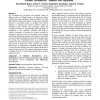Free Online Productivity Tools
i2Speak
i2Symbol
i2OCR
iTex2Img
iWeb2Print
iWeb2Shot
i2Type
iPdf2Split
iPdf2Merge
i2Bopomofo
i2Arabic
i2Style
i2Image
i2PDF
iLatex2Rtf
Sci2ools
104
click to vote
CHI
2004
ACM
2004
ACM
Off-task behavior in the cognitive tutor classroom: when students "game the system"
We investigate the prevalence and learning impact of different types of off-task behavior in classrooms where students are using intelligent tutoring software. We find that within the classrooms studied, no other type of off-task behavior is associated nearly so strongly with reduced learning as "gaming the system": behavior aimed at obtaining correct answers and advancing within the tutoring curriculum by systematically taking advantage of regularities in the software's feedback and help. A student's frequency of gaming the system correlates as strongly to post-test score as the student's prior domain knowledge and general academic achievement. Controlling for prior domain knowledge, students who frequently game the system score substantially lower on a post-test than students who never game the system. Analysis of students who choose to game the system suggests that learned helplessness or performance orientation might be better accounts for why students cho...
CHI 2004 | Human Computer Interaction | Intelligent Tutoring Software | Off-task Behavior | Prior Domain Knowledge |
Related Content
| Added | 01 Dec 2009 |
| Updated | 01 Dec 2009 |
| Type | Conference |
| Year | 2004 |
| Where | CHI |
| Authors | Ryan Shaun Baker, Albert T. Corbett, Kenneth R. Koedinger, Angela Z. Wagner |
Comments (0)

